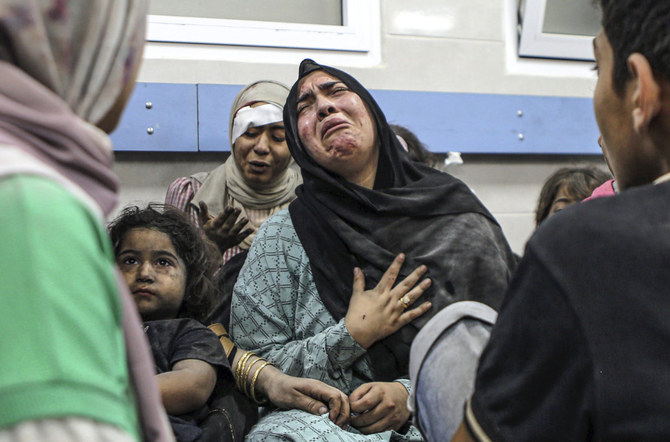
- ARAB NEWS
- 30 Jun 2025

For years, I have asked Israelis that I have engaged with if they could give me a credible and effective way that Palestinians could achieve freedom from the foreign occupation they are living under. No one has ever been able to articulate a process or methodology that could credibly produce the desired goals, while many ineffective and disproven ideas were regularly thrown into the discussion. The simple question remains, haunting all of us: Can anyone give the Palestinians a solid, credible way to bring about the end of the 75-year refugee crisis, the 56-year occupation of the West Bank, and the 16 years of the siege of Gaza?
Palestinians were told to recognize Israel and the relevant UN Security Council resolutions and that would be the road to freedom. Palestinians did exactly that in 1993. Result: The number of illegal Jewish settlements and settlers has more than tripled and Palestinian liberation is even further away now than it was before.
Some argued that the road to liberation was through nonviolence. Palestinian nonviolent activist Mubarak Awad preached that idea, and he was deported by Israel. The effort to apply nonviolent boycotts within the Boycott, Divestment and Sanctions movement, inspired by the South African model, was delegitimized as antisemitic. Tens of laws were passed in US states, while national legislation is being studied in the UK, punishing citizens for supporting the boycott of a country — Israel — that is violating international law.
Israelis said that the Palestinians must have a democracy for Israel to allow the existence of a neighboring independent country, although this was never a condition on either Egypt or Jordan. Free and fair Palestinian elections (supervised by the Carter Center and others) were held a few times until Hamas supporters won, and then the very same countries that pushed for elections and democracy privately advised President Mahmoud Abbas against it for fears that the moderates would lose.
Politically, Palestinians were told Palestine would be free if they put aside armed resistance and cooperated on security with Israel. Again, this was carried out totally to the satisfaction of Israeli security officials despite public opposition. Result: Abbas was seen as weak and unable to protect his own people from settler violence and even pogroms. And instead of politically engaging with Ramallah and the Abbas leadership, Israel paid more attention to appeasing Hamas.
International legal experts told Palestinians that the International Criminal Court was the best channel. That also was tried. War crimes, especially the ongoing illegal settlements and the well-documented case of the killing of an American-Palestinian journalist, were presented to the ICC. But despite their importance and meticulous research and documentation, these charges are collecting dust in The Hague while the more recent Russian war crime allegations are given top priority.
The effort to apply nonviolent boycotts, inspired by the South African model, was delegitimized as antisemitic.
Daoud Kuttab
Hamas’ operation against Israel on Oct. 7 was carried out on the basis of the internationally sanctioned right of people to resist. Sure, there were atrocities committed by Hamas and others, including by some Palestinians in Gaza who have been cooped up like animals for 16 years. When they suddenly saw the fence down and the roads open, with Israeli soldiers not around, some went on a rampage, killing and looting. Over the years, Israel has continued this unauthorized siege on Gaza, which the Latin Patriarch of Jerusalem Cardinal Pierbattista Pizzaballa has called “an open prison.”
Did Hamas members who broke out of the siege carry out war crimes? Possibly. Did their leadership publicly condone it? No. But now the Israeli government — a member of the UN — is not only committing war crimes, but its officials are also publicly saying that they are denying food, water and electricity to 2.2 million Palestinian civilians, most of whom are not members of Hamas.
Palestinians were always told that the balance of forces is tilted against them, that even their Arab brothers and sisters are abandoning them, and therefore they should take whatever breadcrumbs Donald Trump or Benjamin Netanyahu offer.
Over the years, the one possible compromise that both Israelis and Palestinians appeared to be able to live with was the often-repeated two-state solution. While the idea of an independent state on June 4, 1967, borders is a possible solution, there has been little political effort to make this a reality. The world has recognized one side of the two-state solution, i.e., Israel, since 1948, but most Western countries (apart from Sweden) have refused to recognize the state of Palestine, despite 138 out of 193 UN member states having done so. Even the offer by Palestinians at the UN of the need to recognize Palestine as a state under occupation has been rebuffed with the threat of a US veto in the Security Council.
The current onslaught on Gaza must stop immediately and lives must be saved. Once a ceasefire is declared and enforced, the one question mentioned earlier remains valid and must be asked to Israelis and the international community, including US President Joe Biden. If there is global consensus on the two-state solution, what is now needed is a roadmap to bring about the end of decades of carnage and allow the peoples of the area to live in peace.
• Daoud Kuttab is a former professor at Princeton University and the founder and former director of the Institute of Modern Media at Al-Quds University in Ramallah.
X: @daoudkuttab